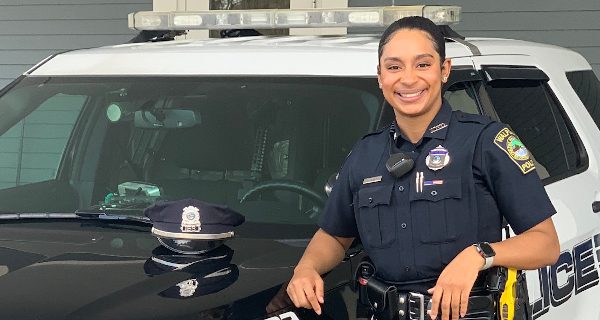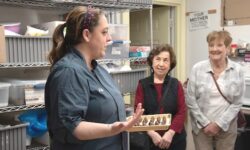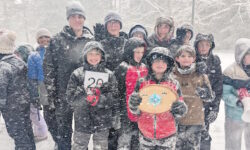By Linda Thomas
Hometown Weekly Correspondent
Ernest Hemingway once offered some simple advice for trusting people: “The best way to find out if you can trust somebody is to trust them,” he wrote.
This likely would have been a difficult concept to embrace, though, for a young girl growing up in a tough part of the world, where trusting even the local police could be a dangerous proposition. But, through her passion for running, she learned about trust and became a symbol of trust for others, people who themselves might sometimes find it difficult to trust.
Nicole Genard was born on September 17, 1994 in Haiti. When she was 2, she went to live with her grandparents and single mom in the market town of Dajabón in the Dominican Republic, located on the border with Haiti. Her father was Dominican. Her mother was Haitian. Both grandfathers were police officers. “People trusted them,” she said. “So did I.”
Like any ordinary week-day afternoon, Genard customarily walked home from school cutting through the open-air market.
But that day in 2004 was no ordinary day — not for the then 10-year-old, whose spirit was momentarily crushed but whose trust in people weighted heavily on her young shoulders for the next several years.
She heard cries from a woman and saw her being physically beaten at the hands of a police officer, hitting her hard with a large stick on her forearm and pushing her to go back to the other side of the border. The woman was Haitian and only spoke Creole, which Genard understood.
“I’m not stealing it … I’m trying to return it,” the woman shouted.
Genard learned a Dominican woman dropped her cellphone on the ground. The Haitian woman found the phone and looked around to see who might have dropped it, hoping to catch up with the other woman. But the officer grabbed her, assuming she was stealing, not giving her a chance to explain despite the language barrier.
Genard’s instinct was to come to the woman’s rescue.
“I wanted to so badly but didn’t know how,” she recalls. “I wanted to get my hands and my body between that police officer and the woman. Even though he was a police officer, he was wrong.”
Genard ran toward the police officer to tell him the woman wasn’t lying. But as she got closer, she was pushed aside by a family friend, protecting her from being hurt as well. She knew then to set a goal that one day she would be in a position to protect people from being victimized.
Today, Genard, now 25, can be seen patrolling Walpole neighborhoods. Though donning a tough exterior and a persona of authority, inside she carries a warm and caring soul. Someone, she says, people can trust.
Growing up, she saw how hard her mother worked at odd jobs, even driving a truck, in an effort to establish herself and help to build a better life for her daughter. Yet, young Genard was shuffled from one town to another, one country to another, making it hard for her to make friends or to stay in a school for any length of time.
But life as she knew it changed once mother and daughter moved to Somerville, where Genard attended public school. Coming to the United States at age 11, Genard only spoke Spanish and Haitian Creole. She learned English in the eighth grade.
“I didn’t know the language. I didn’t have friends,” she said. “I really didn’t trust anybody.”
She loved sports and excelled at many. But running filled a void. It gave her solace and solitude, putting any frustration that stirred inside her aside, at least for a while. “I might have been running as a way to escape what was happening to me … a sense of freedom,” she said. “It became my passion without even trying to make it a passion. I couldn’t wait until I finished my chores over the weekend so I could run on the track.” She joined the track team in middle school. Perhaps running gave her purpose and may have been the catalyst for her renewed trust in people.
Charlie ORourke, retired science teacher at Somerville High School and 43-year veteran track coach, first saw Genard at the elementary city-wide track meet. “She was terrific,” he said. “And when she came to Somerville High, I sought her out right away.”
ORourke saw how hard it was for Genard to communicate with her teammates. English was her third language.
“In her first and second years of high school on the track team, she was frustrated,” ORourke said. “She didn’t understand what was being said in English, so I reached out to her Haitian and Spanish teammates who were bilingual to translate what was being said to her. But she was a quick learner and it wasn’t long before she was fluent in English.”
Track-wise she was outstanding, ORourke said. “She was numerous time Massachusetts state champion in the hurdles and javelin, and national champion in the javelin during her junior year.”
ORourke knew early on Genard was not able to readily trust others.
He became her “voice of reason,” she said, and a father figure here in the states.
“Trust me, you’re going to be a good athlete,” she’d often hear him tell her. “Trust me, when I tell you that showing up for practice and giving it all you’ve got every day is going to get you to where you want to be in life.”
“She’d circle the wagons easily,” he said.
“I would tell her, ‘you shouldn’t be doing this,’ or ‘this is good for you.’ And as years went by, you could see beneath a tough exterior, there was a very warm and caring person. Sometimes she would not let that out because of the trust thing with people.”
He said they battled a lot.
“No means no,” he’d tell her, or “You can’t do it… stop doing that.
“Finally, she realized I was looking out for her best interest, not only as a student, but as a person,” he said. “As a parent, you want to keep your kids tired before they come home, feed them then have them do their homework.
“Basically, what Nicole had to do was believe in people, and trust them,” ORourke said. “But it wasn’t what she grew up knowing. If she wasn’t doing something at the school, like running, and if we weren’t keeping track of her, who knows what direction she would have taken. She needed to keep busy. She would have excelled at any sport. But running she took to right away. It’s a team sport, but very individual.
“She got recognition early, and that may have given her confidence.”
After high school, Genard received a full scholarship to Northeastern University, where she earned the title of captain of the New England championship track and field team, champions for four seasons in a row.
While at Northeastern, she participated in a six-month internship at the Northeastern University Police Department and also took part in the school’s outreach program with kids in the neighborhood. As a cadet, she’d hang out with troubled teens in her spare time, show them the campus and basically mentor them in hopes they would consider college after high school.
She majored in criminal justice and minored in sociology and psychology and graduated with a Bachelor of Science degree in 2016. She then enrolled in the MBTA Transit Police Academy through Northeastern University. From there, she spent the next two years as a police officer with the Northeastern University Police Department before transferring to the Walpole Police Department.
“Whenever we would host an elementary track meet with kids from all ages competing, Nicole was like a different person,” ORourke said.
“With her teammates, she was a drill sergeant. But when she was helping the little kids, she was extraordinarily kind, helpful and caring — especially with the Haitian or Spanish kids who didn't speak English. You could see she cared … and didn’t want them to feel uncomfortable.
“Maybe she recognized she was that little girl at one time,” he said. “That really made an impression with me when I saw that. She seldom let her guard down, but she did when she could help someone.”
Genard serves as mentor to children at the Home for Little Wanderers and she picks up donuts and iced coffee for the staff. It’s not part of her job description at the police department — just something she chooses to do.
And as we currently face collective uncertainty — isolation and anxiety — Genard reaches out to the Walpole community, on and off duty, with gestures of support and help in any way she can, especially to seniors.
How often are we misled by the fear that broken hearts cannot be mended, that tortured relations cannot be repaired, that gestures of love will not be reciprocated? And how often do we give up and stop trusting? What lessons, then, can we glean from this potentially traumatic story with a thankfully happy ending? The lesson is a simple one.
Sometimes, as Hemingway wrote, we just have to trust.
The heart is a remarkable organ that perhaps ignores our carefully laid plans in favor of unexpected opportunities. We inspire one another not simply by the things we say, but by the things we do — and believing that we can be assured goodness will be passed on in ways we don’t always expect when we open our hearts to the most helpless among us.
Nicole Genard had a goal: to get a college degree and become a police officer.
“She should be a role model for all young women,” ORourke said. “She’s moving forward. No looking back.”
Editor’s Note: Linda Thomas writes for Hometown Weekly Publications, Inc. For comments and suggestions, she can be reached at lindasfaces@gmail.com.

























